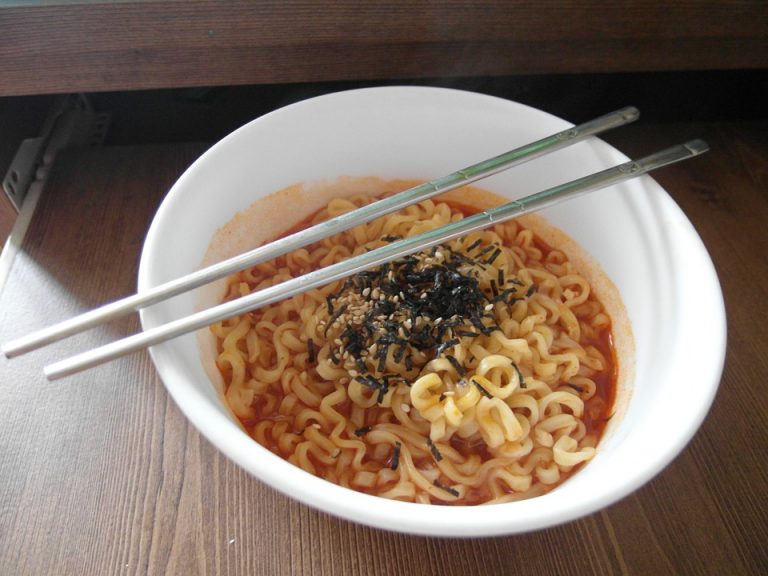Instant food has become very popular and widely accessible. In response to the lack of time and fast pace of life we reach for easy replacements of normal food. But do we know what exactly what instant products are and how are they created? Are they healthy? Is it worth it?
What does it mean when the product is instant?
Instant for food means as much as ready after the water has boiled. This term refers to a powdered foodstuff intended for dissolving in water or another liquid, ready for consumption without cooking. Products of this type are also sometimes called comfort foods. Examples of instant products are instant noodles, soups and ready-to-drink sauces, instant coffee, pudding and non-cooking jelly, and powdered milk.
How are instant products created?
Instant food is produced in the process of instantiation. This process involves complete processing of food, including the complete removal of water from the product so that it has a structure that allows immediate ability to take water back. Instantization of products can be made using the lyophilization or spray drying method.
Instant food history - instant noodles
The flagship instant product is an instant noodle soup. Momofuku Ando, is considered the maker of the noodle soup, which can be prepared by pouring boiling water over it. The aim was to create a product that was easily accessible to combat the problem of food shortages. The idea was based on the Japanese ramen soup. First instant noodles appeared in 1958. Interestingly, the early versions of the soup were considered luxury goods. Not surprisingly, their price exceeded the price of udon pasta.
The first instant noodles were produced for astronauts. Later they became popular on long-distance trains in Russia. In 1971 Momofuku released instant noodles - Nissin - sold in a plastic cup, which is already a dish intended to serve the food. This product began to gain popularity in Japan as its price dropped. The main ingredient in instant noodles is pasta. It consists of wheat flour, salt and water, unfortunately also contains a lot of phosphates, sodium, and potassium carbonate.
Properly cooked pasta is fried in deep fat and then dried. In addition to pasta in instant noodles, we will usually find a small sachet with spices and oil - they give the dish a characteristic flavor. They contain large amounts of salt and sodium glutamate, used as a flavor enhancer. The applied processes and composition of Chinese soup makes it a heavy-duty product, digested longer than the usual pasta.

Are instant products healthy?
It must be noted that not every instant product is the same. However, in most dishes such as instant noodles and soups, we will find a lot of unnecessary and detrimental to our health ingredients.
What we can find in many instant dishes:
- Salt - in excessive amounts can lead to high blood pressure.
- Sodium Glutamate - strengthens the taste. Excessive consumption can cause dizziness, headache, palpitations, excessive sweating, anxiety.
- Trans fats - prolong the usefulness of instant products for consumption, but have a negative impact on our health. They can affect the increase in LDL cholesterol among other things. They promote fatigue and atherosclerosis.
- Mushrooms - thanks to which the pasta swells rapidly.
- Taste and smell enchanters.
- Preservatives.
- Food dyes.
Regular and excessive eating of instant foods, such as instant noodles has a negative effect on our health. Products of this type are characterized by low nutritional value.
Is it always unhealthy?
Instant foods include, but are not limited to, products such as instant coffee and lyophilized dishes.
Lyophilisation removes water from the product using low temperatures, so that the dishes retain the original taste, natural minerals and vitamins. Products such as meat, vegetables, fruits, mushrooms, fish, cheeses can be lyophilized. Thanks to this treatment they become lightweight, and airtight packaging ensures long product life. Their preparation is as quick and easy as instant noodle products. Put the contents of the bag in hot water and wait a few minutes. Lunches are usually ready after about 4-6 minutes.
Lyophilized food has much more nutritional value, while retaining the features of instant product.
Instant products - conclusion
In conclusion, in times when we suffer from permanent lack of time, we are eager to choose snacks, which take just minutes to prepare. Just pour hot water over it. Instant products are very easy to prepare, but are not balanced in terms of vitamins and minerals, often contain large amounts of salt. This meal, when eaten from time to time, will not hurt, but regular consumption of instant soups or ready meals can bring harm to our body. If you want to prepare food quickly, you can get better food / lyophilized products.






